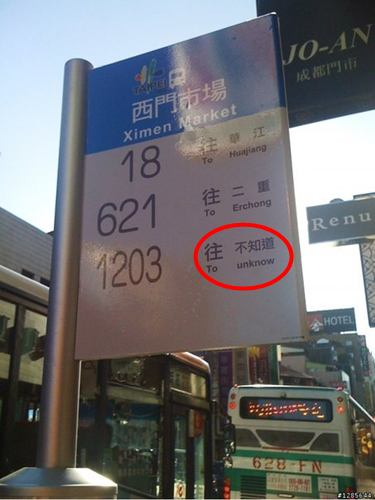A Bus to Don't Know
« previous post | next post »
Dan Bloom just sent me this photograph that is making news in Taiwan:

Riders are advised against taking bus no. 1203, because the authorities don't know where you might end up if you do.
As a matter of fact, there's no serious problem with the translation, since, with the addition of an "n" ("unknown"), that's what the Chinese says:
Bù zhīdào 不知道 ("don't know")
This is one of the first, and handiest, utterances one masters when learning Mandarin.
Mark Swofford at http://www.pinyin.info/ specializes in keeping track of problems with signs in Taiwan. I wonder if he knows about this one and the story behind it.
Electric Dragon said,
September 6, 2010 @ 8:41 am
A placeholder that wasn't spotted and the sign manufacturer just did what they were told?
Like this election leaflet: http://thedailywtf.com/Articles/Existential-Philosophy.aspx#Pic4
Chad Nilep said,
September 6, 2010 @ 10:13 am
I wonder if there is a local neighborhood called Buzhi Road ( [[不知]道])?
Victor Mair said,
September 6, 2010 @ 11:19 am
@Chad
Brilliant!
Mr Fnortner said,
September 6, 2010 @ 12:08 pm
Here, one might take the bus to Nowhere, Okla., Lost City, W. Va., Why, Ariz., or No Name, Colo.
groki said,
September 6, 2010 @ 1:03 pm
from chapter 47 of the Tao Te Ching:
The further one goes
The less one knows
Therefore the sage
Knows without going
Claw said,
September 6, 2010 @ 3:36 pm
The link to the Chinese article features another interesting linguistic utterance (emphasis mine):
Has using "po" to mean "post" become more common in Taiwan rather than a more native Sinitic word?
Just another Peter said,
September 6, 2010 @ 7:10 pm
There's also a Mount Nameless near Tom Price in Western Australia.
Noni Mausa said,
September 6, 2010 @ 8:40 pm
Heh. Maybe the #1203 is Mr. Gabriel Syme's train to nowhere, he who was Thursday?
"The rare, strange thing is to hit the mark; the gross, obvious thing is to miss it. We feel it is epical when man with one wild arrow strikes a distant bird. Is it not also epical when man with one wild engine strikes a distant station? Chaos is dull; because in chaos the train might indeed go anywhere, to Baker Street or to Bagdad. But man is a magician, and his whole magic is in this, that he does say Victoria, and lo! it is Victoria."
http://www.gutenberg.org/etext/1695
exackerly said,
September 6, 2010 @ 9:24 pm
"…and lol it is Victoria." Chesterton invented lol?
Michael Turton said,
September 6, 2010 @ 10:39 pm
Nothing shows more clearly how Chinglish is a quality control problem, not a language issue.
dirk alan said,
September 6, 2010 @ 11:44 pm
once you know it is impossible to unknow – confusedius
Dan Bloom said,
September 7, 2010 @ 12:08 am
@Claw asked: "Has using "po" to mean "post" become more common in Taiwan rather than a more native Sinitic word?"
Yes. PO, usually capped, now appears in Chinese-language newspapers and websites 24/7……and meaning "to post" or "posted"……popular in Taiwan for over a year now…. I had to ask
my college-age friends to understand it when I first started seeing it…..
PS: the news story about the bus to DON'T KNOW was on all the TV news programs over the weekend, they even interviwed the driver of bus 1203 and asked him if he knew where the bus went and he said "Bu Tsu Dao"
Rob P. said,
September 7, 2010 @ 6:43 am
Electric Dragon appears to be correct.
http://www.dailychilli.com/news/6115-a-bus-to-nowhere
It said the destination for bus No 1203 should be left blank for the moment and blamed the mistake to the signboard-making company who "tried to be smart".
"We believe the company has tried to be smart and added the word on the space meant to be left empty."
SeanH said,
September 7, 2010 @ 7:03 am
A use/mention problem, then? Rather like this cake?
[(myl) Or this one…]
Colin John said,
September 7, 2010 @ 8:57 am
There's also 'Innominate Tarn' in the Lake District of N.W. England.
(For non-UK readers 'tarn' = small mountain lake in Northern English dialect.)
Steven said,
September 7, 2010 @ 6:16 pm
Along similar lines, my family hails from Uncertain, Texas.
Nusquam said,
September 8, 2010 @ 9:01 am
The Chinese translation of the title of Scorsese's film about Bob Dylan, 'No Direction Home', seems to be 没有方向的家 (with 'home' as head of the phrase). Perhaps this is the bus that takes you there.
John Cowan said,
September 9, 2010 @ 6:33 pm
The odd HTML on the second cake is indeed Internet Explorer-specific.
Marcel Z. said,
September 10, 2010 @ 3:32 pm
How did 不知道 become "unknow" ?
Peter said,
September 20, 2010 @ 9:52 pm
"[不知道] is one of the first, and handiest, utterances one masters when learning Mandarin."
Oh, but you can seem ever so much cleverer by using "我也不太清楚" (I'm not too clear about that either).